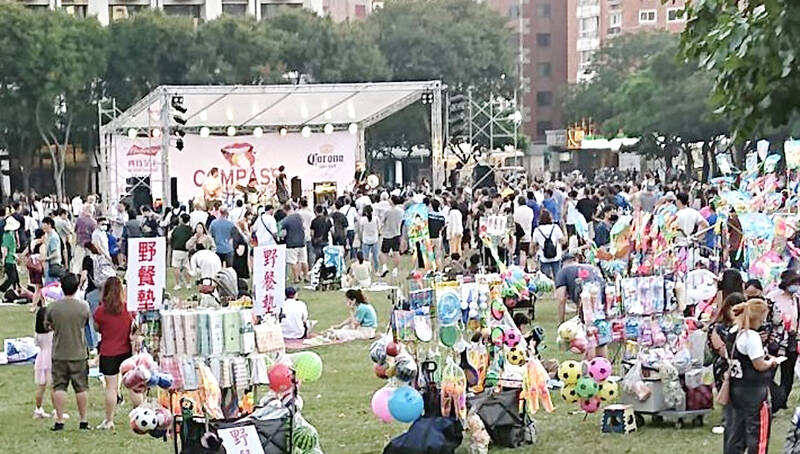Over a few beers before a recent rehearsal, bandmates joked that front man Shaun Armstrong of The ShapeMaster, might break a string on stage at this weekend’s Compass Taichung International Food and Music Festival.
“You get really pumped up,” said drummer Tim Tucker of ShapeMaster, a hard driving four-piece indie rock band from Taichung. “You get to unleash.”
ShapeMaster is scheduled to close out Saturday’s festivities with an hour-long set starting at 8pm.

Photo courtesy of Compass Magazine
The two-day bash, now in its 20th year, is expected to attract thousands to Civic Square, the city’s premier outdoor concert venue.
In addition to plenty of food and drink options, there’s a diverse musical lineup of about 20 bands, with genres ranging from jazz and hip-hop to country and modern rock.
Armstrong described Tucker as a technically gifted and animated drummer.

Photo courtesy of Kyle Merriman
“He’s known for stripping down and playing in his boxers,” he added.
What’s exciting, the band members say, is the rare opportunity to crank up the amps and play loudly in front of a lively crowd. Taichung, which used to enjoy a healthy live music scene, has had many of its large music venues close over the years.
“It’s one of my favorite shows of the year for that reason,” said Brahm Gawdan, who shares rhythm and lead guitar with Armstrong.
An earlier version of ShapeMaster, The Ever So Friendlies, first played the Compass festival back in 2009.
With Craig Sigmundson on bass, ShapeMaster has been part of the Taichung music scene for about a decade, releasing their single album “All the Shapes” last year.
“They’re very powerful,” said Courtney Donovan Smith, co-publisher of Compass Magazine, which organizes the annual festival. “Their music is rhythmic and danceable.” (Smith is also a columnist for the Taipei Times.)
And Saturday night’s crowd will certainly be grooving to one of ShapeMaster’s most popular songs, Fatal Dose. It’s all about having the devil on your shoulder and the temptations that ensue.
“It’s a pure rock ‘n’ roll song. Simple, slow and bluesy,” said Armstrong, who’s the band’s lead singer. The tight-knit group writes their music collectively with Armstrong usually adding the lyrics later on.
Known for liking a good metaphor, Armstrong turned a childhood memory of regret after running away from a confrontation into the fast-moving song Recordion.
“I’m generally not good at expressing myself unless I’m writing lyrics,” Armstrong said with a touch of humility.
And if the hard-strumming Englishman does break a string during the set, the band is ready, as it has been before.
“It’s called the Broken String Cavalry,” Armstrong said. “They have a couple songs ready and I’m their biggest fan. I get to hear them as I change my strings.”

The canonical shot of an East Asian city is a night skyline studded with towering apartment and office buildings, bright with neon and plastic signage, a landscape of energy and modernity. Another classic image is the same city seen from above, in which identical apartment towers march across the city, spilling out over nearby geography, like stylized soldiers colonizing new territory in a board game. Densely populated dynamic conurbations of money, technological innovation and convenience, it is hard to see the cities of East Asia as what they truly are: necropolises. Why is this? The East Asian development model, with

June 16 to June 22 The following flyer appeared on the streets of Hsinchu on June 12, 1895: “Taipei has already fallen to the Japanese barbarians, who have brought great misery to our land and people. We heard that the Japanese occupiers will tax our gardens, our houses, our bodies, and even our chickens, dogs, cows and pigs. They wear their hair wild, carve their teeth, tattoo their foreheads, wear strange clothes and speak a strange language. How can we be ruled by such people?” Posted by civilian militia leader Wu Tang-hsing (吳湯興), it was a call to arms to retake

Desperate dads meet in car parks to exchange packets; exhausted parents slip it into their kids’ drinks; families wait months for prescriptions buy it “off label.” But is it worth the risk? “The first time I gave him a gummy, I thought, ‘Oh my God, have I killed him?’ He just passed out in front of the TV. That never happens.” Jen remembers giving her son, David, six, melatonin to help him sleep. She got them from a friend, a pediatrician who gave them to her own child. “It was sort of hilarious. She had half a tub of gummies,

The wide-screen spectacle of Formula One gets a gleaming, rip-roaring workout in Joseph Kosinski’s F1, a fine-tuned machine of a movie that, in its most riveting racing scenes, approaches a kind of high-speed splendor. Kosinski, who last endeavored to put moviegoers in the seat of a fighter jet in Top Gun: Maverick, has moved to the open cockpits of Formula One with much the same affection, if not outright need, for speed. A lot of the same team is back. Jerry Bruckheimer produces. Ehren Kruger, a co-writer on Maverick, takes sole credit here. Hans Zimmer, a co-composer previously, supplies the thumping